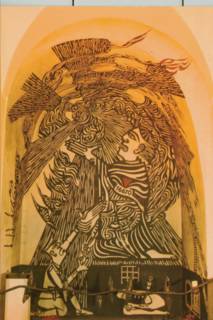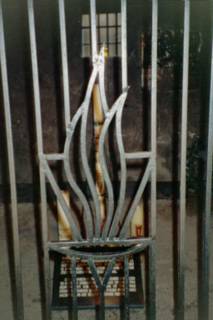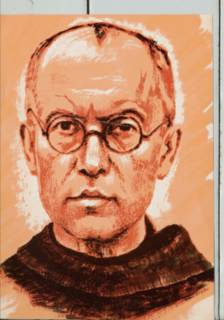(there's more)
In an utterly selfless gesture of love, Father Kolbe stepped forward to take the place of a young man who was facing a death senstence for a supposed infraction of the hopelessly cruel "camp rules." And, having willingly taken responsibility for this young man's offense, Maximillian was locked in a dreadfully small cell in the hellish subterranean darkness of the detention block basment, where he slowly starved to death (this basement is especially notorious in the history of the holocaust, because it is where the nazi's conducted their first "experiment" with the poison gas cyclon-B-they took 120 sick Polish prisoners and 600 Russian prisoners of war, sealed them in a room, and then "gassed" them). The young man whose place Father Kolbe took, went on to survive the camp and live a very long life.
The story of Father Kolbe's unbelievable love is enough to make any Christian burn with a renewed passion to follow Christ to the cross. But the way that we came to be in possession of that story, added a whole new dimension to its inspiriting power. And for me, it all began with an entry I made in my journal dated August 18, five days before we left for Europe. The following is an excerpt that sets the stage(I'm writing about my dad's sudden death and the empty house that remained afterward):
".....So, however empty those rooms may have seemed five years ago, I now know that there were indeed things there that I could hold onto and cherish, even in the midst of the cavernous echoes. Building a home is about beating back the decay of time, fending off the continous onslaught of that nihilistic impulse inside all of us, and erecting a memorial to the one thing that not even the most evil force can destroy, viz. God's desire for us to believe in the inherent goodness of life no matter what. And to believe in life no matter what, is none other than to believe that love is always and forever stronger than hate, that mercy eternally triumphs over judgement, and that the soul is ultimately incapable of being marred by anything, save the callous disregard of its life by the one who possesses it.
And these reflections lead me again to the topic of empty rooms. But they are rooms that I've not yet seen, not even in my dreams. They are the empty rooms at Auschwitz-Birkenau, which we plan to visit during our trip to Europe. We just decided yesterday to go east into Poland, and yet all of the sudden it seems to me like this is something we were meant to do. Indeed, it is something that I feel I have to do. And I can honestly say that I'm horrified at even the thought of going to a place that witnessed such unfathomable acts of human cruelty and suffering. But I know that I must go there, just like I must continue to go and visit the empty rooms of my own past. Because that is where I know I will find Jesus most powerfully, right in the middle of the place where he seems, at first glance, to be least present. He is right there in the midst of all the horror, trying to die, trying to forfeit his life for all of those seemingly God forsaken souls, and especially for those who have stirred up the fires of wrath, the fires that will ultimately consume only them. Nowhere is the inexorable centrality of his life and death more evident than in the midst of these nauseatingly dire circumstances. That is what Mother Theresa knew so well, and because of that she became a beacon of hope to people around the world, even though she lived dead in the center of nearly constant heartbreak. And that is what I've humbly known in my own fragmentary manner, at the darkest moments, on the streets of Lexington, and in the abandoned alleyways of my life. Jesus is right there in the midst of it all, trying to die so that hope might live, trying to take the lashes so that the violence might stop.........."
 Much to my amazement, this journal entry turned out to be prophetic, as we were brought face to face with the story of Father Kolbe by means of a moving memorial to him at DrefaltegeitsKirche (Father, Son, & Holy Spirit Church) in Vienna, Austria. Quite astonishingly, this church was right down the street from the pension that our wonderful friends Mohammed & Omid arranged for us. As I quickly realized, Father Kolbe was the Jesus in the midst of the horror, that the Spirit had been revealing to me as I toiled through my journal entry. And the memorial to Father Kolbe was a remarkable work of art, a disconcertingly personal instance of God revealing his glory to us. But that was only the second leg of the pilgrimage, with the most painful and glorious passage remaining.
Much to my amazement, this journal entry turned out to be prophetic, as we were brought face to face with the story of Father Kolbe by means of a moving memorial to him at DrefaltegeitsKirche (Father, Son, & Holy Spirit Church) in Vienna, Austria. Quite astonishingly, this church was right down the street from the pension that our wonderful friends Mohammed & Omid arranged for us. As I quickly realized, Father Kolbe was the Jesus in the midst of the horror, that the Spirit had been revealing to me as I toiled through my journal entry. And the memorial to Father Kolbe was a remarkable work of art, a disconcertingly personal instance of God revealing his glory to us. But that was only the second leg of the pilgrimage, with the most painful and glorious passage remaining.
 This wonderful mosaic of life, in, around, over, and under, the midst of death, was finally completed when we went to Auschwitz, walked the tortured halls and paths where so many hundreds of thousands died, and stared speechless into the tiny cell where Maximillian slowly died an agonizing death so that another human being might might live. It was the most moving example of a human being embodying the very life and death of Christ that I've ever seen. And, having also encountered many other stories of great men and women of the faith, I earnestly hope that we in the protestant tradition can come to more fully appreciate the deep, deep riches of the saints of the catholic tradition, and the incredible importance of being linked with our past heritage, though not ruled by it, or limited by its shortcomings. Maximillian willingly allowed his body to be starved to death, so that his spirit, and his body, might live a fuller and more vibrant life in Christ. I will never again hear Jesus' words in John 4 without remembering Maximillian. And may we all continue to hear them anew.......
This wonderful mosaic of life, in, around, over, and under, the midst of death, was finally completed when we went to Auschwitz, walked the tortured halls and paths where so many hundreds of thousands died, and stared speechless into the tiny cell where Maximillian slowly died an agonizing death so that another human being might might live. It was the most moving example of a human being embodying the very life and death of Christ that I've ever seen. And, having also encountered many other stories of great men and women of the faith, I earnestly hope that we in the protestant tradition can come to more fully appreciate the deep, deep riches of the saints of the catholic tradition, and the incredible importance of being linked with our past heritage, though not ruled by it, or limited by its shortcomings. Maximillian willingly allowed his body to be starved to death, so that his spirit, and his body, might live a fuller and more vibrant life in Christ. I will never again hear Jesus' words in John 4 without remembering Maximillian. And may we all continue to hear them anew.......
 "While this was happening, Jesus' disciples were saying to him, 'Teacher please eat something."
"While this was happening, Jesus' disciples were saying to him, 'Teacher please eat something."
But Jesus told them, 'I have food that you don't know anything about."
His disciples started asking each other, 'Has someone brought him something to eat?'
Jesus said: 'My food is to do the will of the one who sent me..........
1 comment:
thanks billy. this is beautiful. you have shown me (again) the death/life paradox of Jesus and where true nourishment is found. I hope Father Kolbe's story becomes a touchstone for our life together.
Post a Comment